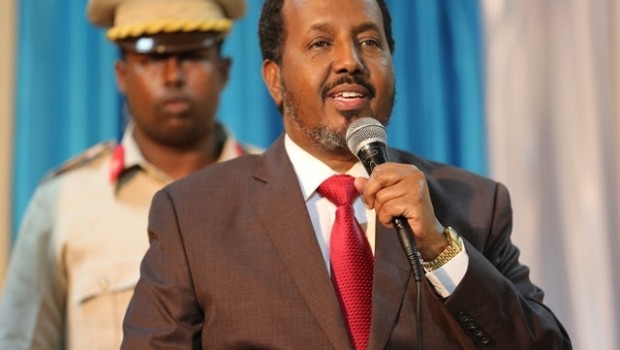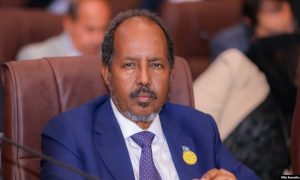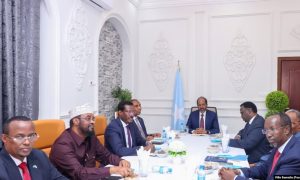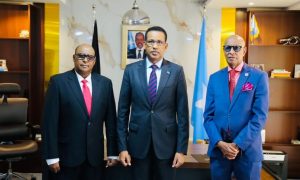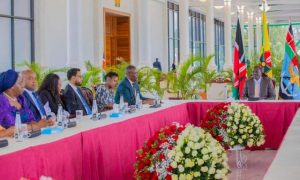
10th September, 2015
We are together tonight, looking at the future of Somalia..
Today, we are talking about Somalia being the victor over our past, over our poverty, over war, over famine, over hopelessness, over extremism, over all the forces that we have battled in our journey to make it to where we are today.
And we have battled. None of us are strangers to the war, strife and struggle that reduced a great country to ruins.
More than 20 years have passed since the first bullet was fired that began the civil war. The war destroyed not only governance institutions, but the very social fabric of our society. The war transformed a once proud people into refugees and asylum seekers all over the world. The war reduced the land of poets to a land of beggars. The war turned our generosity to selfishness, our trustworthiness to suspicion and our pride to humiliation. The war destroyed our identity and created divisions among us. These are facts that we cannot run away from.
Walaalayaal,
War is a calamity and calamities last for a time. But we must move on.
We must draw lessons from our history and focus them on improving the future. Whilst the recent decades have not been good to us, we have a proud, rich history that we should not forget. Our forefathers lived on this land as herders, farmers and fishermen. God in his wisdom gave them this part of the world and they were lucky. Somalia has everything that anyone needs. Our country is not wanting for anything.
As Somalis, we are known for our generosity and hospitality. We lived as horsemen and camel herders, and grew into a nation of proud people. We have strength in our people; in their persistence and business acumen, in resilience and in their self-belief. We need to harness our strengths and correct our mistakes. We cannot be drawn, time and time again, into a whirlpool of political distraction.
The idea and hope for a democratic and pluralistic Somalia based on the rule of law is not a figment of our imagination, nor is it a foreign ideology. It is the founding principles of our nation. Somalia achieved independence through the determination and ideals of our youth who sought to ensure Somalia reflected both the proud heritage of its people and the future of its sons and daughters.
Upon independence, our founding fathers did not seek to create a dictatorship! On the contrary, they charted the path for democracy, elected governments enacting the will of the people. Somalia was the first nation in Africa to accomplish the peaceful handover of power between a president and a president elect.
This is part of our rich history; these are the leaders we seek to emulate, these are the ideals we seek to fulfill.
Three years ago, when I was elected President, I announced the Six Pillar Plan. This plan aimed to draw us out of conflict into peace. It outlined the priorities for this government to ensure the foundations for a secure and prosperous nation are laid. A foundation that could bear the burden and test of time.
These Six Pillars were:
- Full stability. I committed to building a country based on the supremacy of the law and good governance.
- Economic recovery. I committed to building a country where improved livelihoods and infrastructure investment would pave the way to recovery and growth.
- Peace-building. I committed to a national process of social reconciliation, knowing that without the ability for us to forgive, good governance and development could never take root and flourish.
- Service delivery. I committed to ensuring that we steadily rolled out a program of essential public services across Somalia; making sure that people had access to education and health services to support their full participation in Somali society.
- International relations. I committed to ensuring that Somalia took its place on the world stage again, building strong relationships with our neighbors, the region and the world.
- Unity and integrity of Somalia. I committed to building a country that was unified in its own interests, with integrity of purpose and working together.
This plan – even as I first discussed it- was dismissed by many as being too ambitious, as setting us up to fail. But, together with the support of the Federal Government and the people of Somalia, we have achieved.
In the past three years the Government has focused on building a foundation – reopening Ministries, developing laws, activating policies and laying down the groundwork for stabilization and ensuing reform.
Piracy has all but disappeared; around 75% of Somalia has been liberated from Al-Shabaab and returned to the government, more than 75,000 children have been enrolled in school, the sea and airport are fully operational, more than 50 kilometres of road have been built, a comprehensive mapping of Somalia’s extensive natural resources has been undertaken, and the private sector continues to flourish and grow.
We have peacefully formed 3 interim regional administrations the Interim Jubba Administration, Interim South West Administration and the Interim Galmudug Administration. The Boundaries and Federation Commission and the National Independent Election Commission have been established, the review of the Constitution is underway, an action plan and guiding principles for the electoral process for 2016 have been agreed, and troop integration has begun in Kismayo with more than 1500 troops enrolled.
Today, we have reconciliation programs operating in communities all across Somalia. There are people coming together who have not talked with each other for decades, embracing each other in forgiveness. Finding new languages of peace, tolerance, acceptance and hope. The seed of peace has taken root in Somalia and I have no doubt it will blossom into a tree whose branches shelter us all.
Today, we have boreholes being built across Somalia, supplying villages and towns with water for their crops, their cattle, their families. We have seen solar power arrive in Mogadishu, powering our streets, making them safer for businesses to operate and for people to use.
Today we have health clinics providing vaccinations to tens of thousands of Somali children, eradicating polio and other diseases that have held Somalia in their grip for so long. We are providing mothers with places to give birth safely. We are investing in building a healthy nation, able to look after itself and care for each other.
Today we have schools re-opening, national curriculum being designed. Recently we held the first national central exam here in Mogadishu, publicly adjudicated.
Today we have five prime banks operating in Somalia. We have ATMs dispensing cash, businesses accessing money in a timely way to support local commerce.
Just this week the US Government announced the re-opening of its mission to Somalia. Today we have diplomatic engagement with several countries. A number of embassies are open on our soil. We have taken our place on the world stage.
Today we can say that Somalia is connected to the world. We are open for business, we are open for politics, and we are open for the future.
This progress is rooted in the idea of self-reliance, hard work, innovation and self-confidence, and in our entrepreneurial spirit.
The entrepreneurial spirit of our people is exemplified by the trading roots established by our ancestors stretching from the Middle East to West Africa, a history of trading which can be traced as far back as the Ancient Egyptian period. It is a spirit driven by the need to better one’s life. This has seen Somalis create successful businesses both home and abroad, contributing to the economic well-being of many regional economies and further afield.
Harnessing the spirit of our entrepreneurs, attracting back those abroad and providing the right conditions that will allow them to thrive in Somalia is a cornerstone of our economic development plan and the engine which will drive our economy to greater heights.
But none of this is easy, and none of this happened at the click of someone’s fingers. None of this happened overnight. It happened over years and it will continue into the future.
It happened as the result of planning, discussions and the will power of thousands of Somalis.
We will not rest till we have created the Somalia that links our proud and glorious past with an even brighter future.
If the critics are asking whether more needs to be done, I could not agree more – but if anyone suggests to you that what we have accomplished – together in just three years – is not worthy of our collective celebration, ask them to tell that to the mothers, wives, daughters, fathers, brothers and sisters and the many loved ones who have sacrificed so much for this nation.
Ask them if they think the men and women who have lost their lives to secure our nation, have done so in vain? Ask them is the education and health of tens of thousands of Somalis now secured for nothing? Ask them if the tens of thousands of citizens who have come back to their homeland having spent more than a quarter of a century is a refugee camp amounts to nothing.
Walaalayaal,
We cannot drown in a pool of our tears. We cannot cover ourselves in the dust of our own camels. We must take courage. We must walk together. We must celebrate when the time is right. And the time is right now.
Do you realize all that has happened in the past three years? Let me tell you a little.
Last year Somalia went through its first “health check” undertaken by the International Monetary Fund, or the IMF, for more than 25 years. We should take pride that the IMF pointed out the “country has made significant progress.”
The IMF also noted the improvement in the economic conditions of the country which is reported to have “improved significantly”, and above all achieved an economic growth of 3.7% in 2014. Some of this growth can be put down to an increase in our traditional trade such as livestock and fisheries.
More promisingly a major contributor to this growth is our active private sector, coupled with the resurgence of the service industries. As the IMF report notes, “If the security improvements continue, the entrepreneurial private sector will continue to be the most dynamic contributor to economic growth.”
If our economy can achieve a growth of this magnitude in 2014, despite the many challenges and terrorist attacks by those who oppose progress, imagine the possibilities of our economy as we move forward with our work!
The potential of our nation is truly limitless. With the right conditions Somalia’s economy could accomplish double digit annual growth within a decade, and put this country’s economy on the world map.
It is the pursuit of this target which is behind the government’s hard work in this area.
We have worked very hard to improve our financial and economic position. Our focus is on establishing a good governance track record, progressing on key macroeconomic and fiscal structural reforms, as well as improving our accountability towards our citizens and creditors.
We re-established the Central Bank of Somalia, which means that we have the beginnings of a solid financial structure in place for Somalia. The Bank has worked hard to improve core transaction processes so that money is able to flow through to Ministries in support of their activities and staff. To further strengthen the financial environment, the Central Bank has also drafted the regulatory framework for licensing commercial banks and remittance companies.
Considerable progress has been made in strengthening our budget execution controls, with the Somali Financial Management Information System now live. This means that we now have the capability to process payments at the transaction level and minimize cash payments, bringing greater transparency and strengthening the oversight role of the Accountant General.
We have set up the mechanisms that allow us to start oversight systems such as the Financial Governance Committee so that we can be confident that funds, contracts and procurement processes are being set up in a way that ensures transparency of process and results.
We are moving various different legislation through parliament, including the direct foreign investment bill that is designed to facilitate the right conditions to encourage foreign investment.
We have successfully produced a national annual budget for three years in a row. The budget is crafted around two factors: our expectations of the money we will need to spend to support service delivery and other expenses, and the expectation of the money, or income the government will receive from exports, or operating infrastructure such as the Mogadishu Port. The national budget is a key policy tool, which guides the decisions we make about how and how much the government can allocate to services it provides for the country.
It is therefore critical that we are realistic about what revenues we have available and how best to deploy them. This can be a difficult thing to get right.
When we formed the 2015 budget – which we did at the end of 2014- we anticipated more revenue than we have received so far this year. This is due to several of our international partners not delivering on budget support pledges – for good reasons- but nevertheless with a negative effect on Somalia. Also, when the budget was planned, the government was operating with 18 ministries. We have since enlarged this to 25, and this has meant our expenditure has increased in line with having more ministries to support.
Yesterday, the Parliament approved a budget restructure. This is a great sign that our federal institutions have matured enough to support an informed debate about how best to provide for our nation. It is a great sign that the budget is determining how we spend our government funds, rather than being at the mercy of that spend.
All of this may sound like a list of long words, and complicated statements, but put simply, what this means is that no one can dispute that the government is working hard to make sure that the government can function as it should, enable the proper environment for the private sector to grown, and in turn ensure that the resources needed to provide for the Somali people are well-governed, well-directed and are sustainable. We are working to ensure that we can be confident in saying ‘Somalia is open for business!’
Critical to economic stability is the stability of the nation. Federalism is crucial to our national stability and a national identity. It is a fulfillment of our hopes to be One Somalia, and is a continuation of the work started by our founding fathers.
During the past three years we have worked tirelessly to support the formation of the interim regional administrations according to our constitution. We have formed 3 interim regional administrations: the Interim Jubba Administration, Interim South West Administration and the Interim Galmudug Administration.
The effort is ongoing, with current discussions that will finally realize the creation of the last interim regional administration for the Hiran and Middle Shabelle regions. This fledgling new regional state once created will become the last block – completing the federalized map of Somalia.
Federalism will continue to evolve with time. There are many issues this government will continue to work on during the coming year, including establishing boundaries, the statutory duties of regional states, resource sharing and their relationship with the federal government. The work of the Boundaries and Federation Commission will be essential in these processes.
Ensuring government both at the federal and regional level is able to protect the life, liberty and property of our citizens is key to achieving long-term security. Successfully integrating the various existing regional security elements into a cohesive national force is essential in the development of the SNA and achieving our stated goal of a more peaceful Somalia.
All Somalis should be proud of the efforts of the National Integration Committee which has worked tirelessly in partnership with the Interim Jubba Administration and local elders to identify the first contingent of personnel who will make up part of a battalion for the region, as stipulated in the Gulwade Plan.
NIC has not only identified the personnel but also helped establish a training camp in Kismayo for these new recruits. Two more camps will follow in El-wak and Dhoobley. The completion of this process in Jubba will establish a model which will be repeated in all the other regional governments.
This is a prime example of what can be achieved with cooperative leadership both at the federal and regional level, but also by engaging with a cross section of local stakeholders. We must ensure our armed forces are once against revered by the Somali people and seen as a symbol of our independence, honour and dignity.
Earlier this week, I confirmed a series of commitments to reform our security sector. We must build a more integrated, accountable and transparent security sector. Ensuring that the national security sector is subject to rigorous oversight, operates transparently in relation to personnel, purchases, salaries and operations is essential.
We pledge to look after the men and women who are serving in our security sector. The first order of this is to take responsibility for timely, adequate payment to our forces.
To that end, we will ensure that our security service troops are counted within the next three months. We will undertake one comprehensive bio metric registration process to establish a transparent national payroll process. Corruption opportunities will be cracked down with the transfer of all cash payments to electronic payments – with immediate effect. The Interim Procurement Board will oversee all logistic tenders.
An ad hoc approach to establishing systems and processes will be tolerated no longer. We will support all security sector institutions to do better. The Somali people must have confidence, and our international partners must have confidence that we are establishing a security sector that is well managed and well monitored.
We are all aware of the destructive intent of those who seek a future of hardship, confrontation and conflict for Somalia. For those who profit from the suffering of our people and the hopelessness felt by our youth, to them the idea of a united and peaceful Somalia goes against everything they claim to believe. They will do anything to dampen our morale, undermine our determination and attempt to instill fear in our hearts.
It is for this reason that they have attacked various training camps, AMISOM bases and other security institutions. These extremists cannot stand to see these patriotic men and women of our own security forces and of our African brothers and sisters. They cannot stand those whose values contradicted their own. They cannot stand to see people who have hope for Somalia and are willing to protect it. They are slaves to their perverted ideology of killing for a hopeless cause.
They will not succeed. We will not allow them to succeed.
Somalia will only develop as it should and could, and as our people expect, once we as a nation are able to fully secure our country, and root out the terrorist plague which for so long stunted our nation’s development.
Terrorists and the harbingers of doom have for the past three years have fought literally, and through the media to convince the Somali people of the futility of the government’s endeavor to rebuild our national institutions.
They sought to label the assistance we receive from the International community as a new form of colonialism. They told us the African brothers who bleed with us are invaders and the Somali people who have hope for Somalia are apostates.
But look around you. Let your eyes tell you the truth. Today we can walk through Mogadishu, to restaurants, to shops, to internet cafes, to businesses. We can play soccer on the streets, swim at the beach, and join friends outside.
Today- in 75% of Somalia- al-Shabaab holds no power.
In desperation, and because of the military success against them, al-Shabaab has turned to small-team asymmetric warfare tactics to conduct higher impact terrorist attacks against various targets in Somalia, and increasingly on neighboring countries.
With this context in mind, I want to spend a few minutes talking about our current efforts to confront and ultimately defeat al-Shabaab.
First, we firmly believe that as formidable as al-Shabaab is as a group, it is not invincible.
Working with AMISOM and international partners, we are determined to comprehensively defeat al-Shabaab.
We have worked to develop the policy and legislative environment that will enable a Somali- led response to counter-terrorism. Somalia’s counter-terrorism strategy, approved earlier this year by our Council of Ministers enables us to confront terror networks by disrupting and denying their ability to operate freely.
Our amnesty policy has been very successful in persuading al-Shabaab members to convert to the government’s cause by giving ample room to those who are willing to reconcile.
We are putting this strategy on the ground through very practical actions, including strengthening the capacity of our security force personnel on the ground, including those on the front lines and those protecting our citizens and government offices. We have done this through developing rapid reaction strike force units in the Somali National Army, along with a Special Forces Unit (Gashan).
A Counter Terrorism Unit & Rapid Response Team within the National Police Force has also been equipped and receives training and mentoring to improve tactical raid and arrest capacity. Our specialist CT forces have foiled many terrorism attempts in Mogadishu over the past few months.
Importantly, we are working with our international partners to establish a network of rehabilitation and reconciliation centres for the many young people who are leaving al-Shabaab. Working in line with strict human rights guidelines these centres are giving young people and their families hope for the future- equipping young people with new skills, and helping them reconcile with communities.
Over the last three years we have continually degraded al-Shabaab’s ranks. We will continue until every last piece of earth in Somalia is liberated from them. We will not rest.
There is one thing that will strike fear into the hearts of our enemies more than anything else. And that is the rebuilding of Somalia.
At the heart of rebuilding this nation is a commitment I made three years ago to pursue democracy.
And now, as I did, and as our forefathers did before us, this nation must commit itself, before we end this year, to secure a transparent and accountable process for a peaceful transfer of power in September 2016.
The future of Somalia is embedded in democracy and will only be secured through inclusive, and equality of access to that democracy. In 2012, we recognized that these ideals would be best secured by an election that allows every eligible citizen the chance to directly elect their own representative. However that will not be possible in 2016.
Let me be clear: the goal posts have not changed: one person, one vote is undeniably the best option for future transfers of political power in Somalia.
But with any large-scale political endeavor that results in profound change, we must be sure that those changes, and the process through which we arrive at that do not create the very conflict it is designed to prevent in future.
Over the next four months through a national consultation mechanism: the Federal Parliament, the executive, regional leadership, and the Somali people, must work together to determine how we best ensure the smooth transfer legitimacy of the transfer of power in 2016.
The process must be aligned with the spirit of the Constitution and should ensure an outcome that is representative of Somalia society today.
National unity must be safeguarded through the process, and the process should also be realistic with regard to Somalia’s security, resource and capacity situation, transparent and accountable. It must result in enhanced legitimacy of both the Executive and the Parliament.
This will be no small feat.
I remain absolutely committed to such a process that will enhance the legitimacy of our democratic ideals, retains and strengthens the gains we have fought so hard to attain, secures the support of our partners, and reinforces the spirit of the constitution.
As President, I commit wholeheartedly to making sure we achieve this. I count on your support to make this possible.
My fellow countrymen and women-
Tonight we have only had a short time to consider where we have come from, and where we are now. I leave you now with what we must work on for the future.
We must form the remaining interim regional administrations, we must ensure a strong, relevant Constitution that is clear and applicable to all, and that safeguards the rights of all Somalis;
We must ensure that the processes and systems that signal good governance are linked up from center to states and witnessed by all across Somalia;
We must ensure that laws that help to guide our progress and our functions are in place and applied;
We must train, equip and integrate to ensure a Somali Armed Forces that is capable of standing alone to maintain the security of Somalia;
We must invest in rapid infrastructure development that builds strong domestic revenue streams;
We must secure the future of our children through the continued provision of education and health care;
We must create meaningful employment that is on offer to all;
We must invest in the girls and women of Somalia so that the future is equally bright and accessible to all.
But we must do this together. There can be no discussion about these things; no deviation from what we agree is right and necessary. There can be no distraction.
I promise that I will not deviate from what needs to be done. I hold out my hand to you, the people of Somalia, to grasp- so that we may draw strength from each other, walk alongside each other, and with Allah’s blessing, come together into the future we deserve.
.
Long life Somalia
.
_________________________
_____________________________________________________________________________________
Xafiiska Wararka Qaranimo Online | Mogadishu, Somalia
_____________________________________________________________________________________Advertisement
_____________________________________________________________________________________


